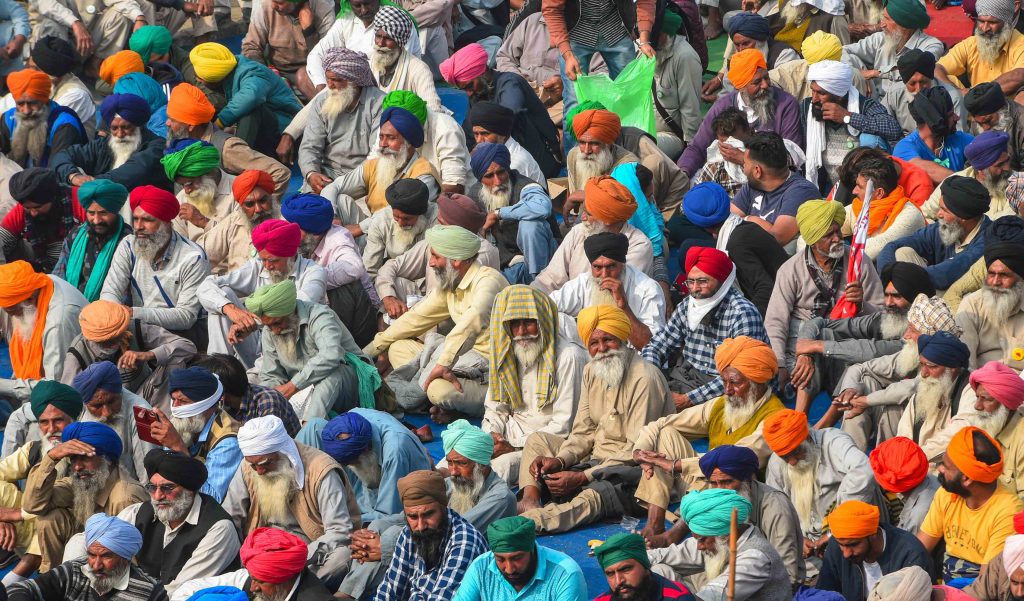New Delhi: Life was disrupted Tuesday in several parts of India as shops and commercial establishments stayed closed, transport was affected and protesters squatted on key roads and rail tracks in response to a ‘Bharat Bandh’ called by farmers demanding a repeal of the new agri laws. The nationwide shutdown against the agri laws was observed in around 10,000 places in 25 states, claimed ‘Swaraj India’ leader Yogendra Yadav.
Emergency services were exempted and banks, too, continued operations as the pan-India shutdown, backed by most opposition parties and trade unions, rolled out noisily but peacefully. The impact of the bandh was felt in Punjab, Haryana and Delhi, the epicentre of the snowballing protests, as well as in states like Odisha, Maharashtra, Bihar and Jharkhand.
The pandemic appeared to recede into the background as security was stepped up across India. Restive crowds demonstrated in some places and the numbers swelled at Delhi’s border points. Protesters also blocked railway tracks at several places in West Bengal, Bihar and Odisha.
As slogans such as ‘Kisan Ekta Zindabad’ were heard in protest centrepoints such as Tikri and the agitation picked up pace, so did social media with the hashtag #Aaj_Bharat_Bandh_Hai trending worldwide till late afternoon.
From the Rajasthan capital Jaipur, where ‘mandis’ were closed but shops open, there were reports of clashes between workers of the state’s ruling Congress and the BJP.
In Delhi, where most main markets were open, tension spiralled with the ruling Aam Aadmi Party (AAP) alleging that Delhi Police had put Chief Minister Arvind Kejriwal under house arrest till evening. City police denied the claim but AAP leaders stuck to their stand.
Farmer unions had threatened to block national highways and occupy toll plazas across the country during a ‘chakka jam’ protest from 11.00am to 3.00pm.
All India Kisan Sabha general secretary Hannan Mollah described the shutdown as a show of strength by the farmers. “We are standing by our demand that we want a complete repeal of the three laws and will not accept any cosmetic changes. If our demands are not met, we are ready to take our agitation to the next level,” Mollah said.
The protesting farmers fear the new laws will pave the way for eliminating the safety of the Minimum Support Price (MSP) cushion and do away with ‘mandis’. It will then leave the farmers at the mercy of big corporates. The government maintains the new laws will bring farmers better opportunities and usher in new technologies in agriculture.
Opposition parties are expected to meet President Ram Nath Kovind Wednesday evening to raise their concerns about the three laws.
“Leaders from different political parties (those opposing the farm bills) will sit, discuss and take a collective stand on the contentious farm laws before meeting President Ram Nath Kovind,” NCP chief Sharad Pawar told reporters.
Farmers from Punjab and also Haryana have been the drivers of the movement against the laws. In both states, shops and commercial establishments were closed as were thousands of fuel pumps. Farmers assembled at highways and other key roads in both states since morning.
All major parties in Punjab — the ruling Congress, AAP and the Shiromani Akali Dal – extended their support. Over 50,000 government employees took mass casual leave in support of farmers, said Punjab Civil Secretariat Staff Association president Sukhchain Khaira.
In neighbouring BJP-JJP ruled Haryana, the opposition Congress and Indian National Lok Dal extended their support.
The Haryana Police traffic advisory had warned commuters that main national highways would be closed and the peak time of impact was expected to be between 12.00 noon to 3.00pm.
In West Bengal, the ruling Trinamool Congress joined the Congress and the Left in supporting the shutdown but stayed away from enforcing it. So the response to the ‘Bharat bandh’ was mixed. Railway tracks were blocked in several places and there were sit-ins on major roads.
Life was hit in Bihar too with train tracks, highways and inner roads teeming with protesters as opposition parties extended their support.
Train services were also affected in Odisha as activists of farmers’ organisations, trade unions and political parties held sit-ins on tracks in Bhubaneswar, Cuttack, Bhadrak and Balasore. Elsewhere in the state, ruled by the Biju Janata Dal (BJD), normal life was hit with markets and offices shut and Congress and Left supporters blocking major roads.
Major cities in Congress-ruled Chhattisgarh were deserted with most business establishments closed and public transport keeping away.
In Maharashtra, where the ruling Shiv Sena-NCP-Congress combine extended its support, wholesale markets in major cities like Pune, Nashik, Nagpur and Aurangabad were shut. Retail shops also downed shutters in many cities. Agriculture Produce Market Committees (APMCs) were closed in many parts of the state. The Maharashtra government appealed to protesters to not disrupt public transport services and buses and local trains were unaffected.
“…The situation needs to be created to put pressure on the government, and to achieve this, farmers need to hit the streets. But no one should resort to violence,” said social activist Anna Hazare who went on day-long fast in his village Ralegan Siddhi village in Maharashtra’s Ahmednagar district.
There was a mixed response in other states as well.
In Assam, shops pulled down shutters, protesters blocked traffic and demonstrations were staged but most offices were functioning. Dozens of protesters were detained, officials said.
The ruling TRS and opposition parties, including the Congress and various unions, held protests across Telangana.
In Tamil Nadu, the opposition DMK and its allies, including the Congress, held protests across the state but life was mostly unaffected.
